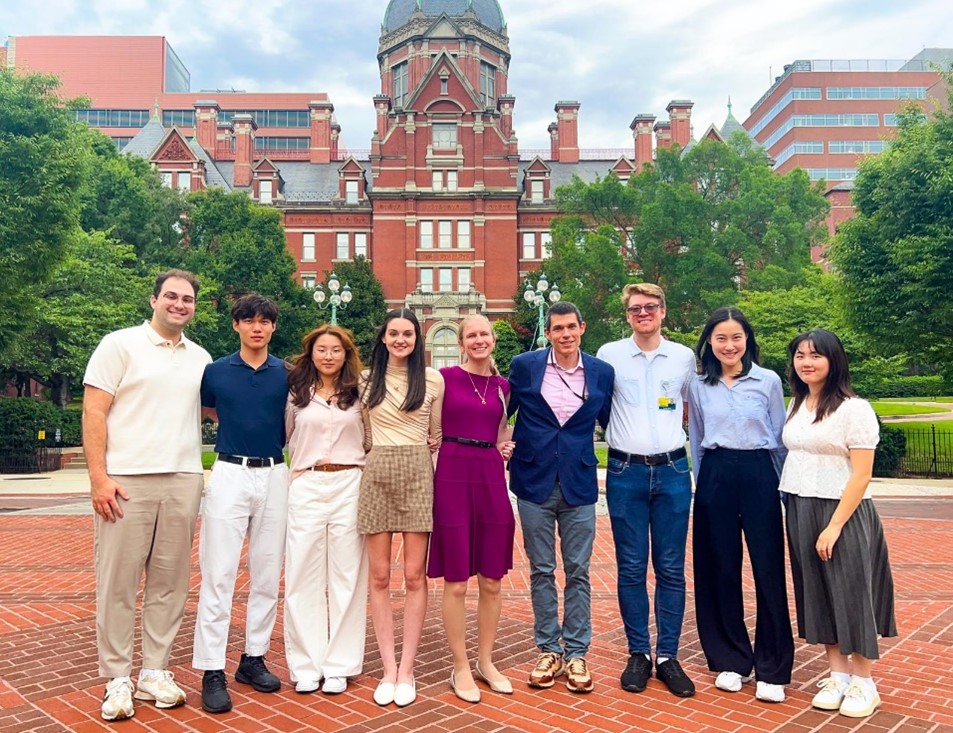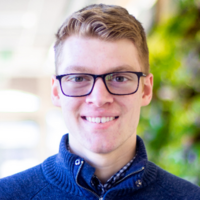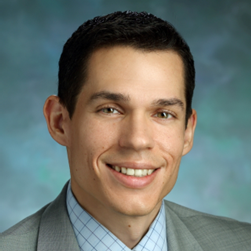Find a CBT Therapist
Search through our directory of local clinicians.
The Center for OCD, Anxiety and Related Disorders for Children (COACH)
Meet ABCT’s Featured Lab
The Center for OCD, Anxiety and Related Disorders for Children (COACH), located in the Department of Psychiatry and Behavioral Sciences at Johns Hopkins University, is directed by Joseph F. McGuire, Ph.D.

- What is your primary research interest?
- If the student is or has ever been a member of ABCT:
- How has ABCT been helpful to you?
- If a student were thinking about joining ABCT, what activities would you recommend they get involved in?
Trainee Lab Members
Kesley A. Ramsey, Ph.D.

What is your primary research interest?
My research centers on investigating the mechanisms that underlie neuropsychiatric conditions, specifically obsessive-compulsive disorder (OCD) and obsessive-compulsive related disorders (OCRD) such as misophonia, Tourette Syndrome and other tic disorders, and anxiety disorders. I am particularly interested in how psychological constructs, such as distress tolerance, mindfulness, and intolerance of uncertainty, relate to the etiology, maintenance, and treatment of these conditions.
How has ABCT been helpful to you?
ABCT is a wonderful community of clinicians and researchers! I have always felt so welcomed by the organization as a whole. ABCT has been and continues to be an exceptional networking and educational resource at every stage of my career (from grad school up into the present).
If a student, postdoc, and/or postbac were thinking about joining ABCT, what activities would you recommend they get involved in (e.g., presenting at ABCT conventions, joining a SIG or committee)?
If you are considering joining ABCT, I highly encourage you to attend one of the ABCT conventions. Whether you are presenting your lab’s research or learning from one of the many exceptional speakers, the annual ABCT convention is always an exciting and energizing conference. Every year that I attend, I find that I walk away with newfound clinical knowledge and inspiration for next big research project. Plus, it is always fun to reconnect with old colleagues and make new friends at the conference.
Lauren E. Browning, B.A.

What is your primary research interest?
My primary research interests focus on understanding the mechanisms of change in evidence-based treatments for children and families and examining factors that influence outcomes. To achieve these goals, my work aims to leverage multi-method assessments and novel technology in evaluating and treating youth mental health disorders.
How has ABCT been helpful to you?
Through attending the convention, participating in special interest groups and committees, and attending webinars, ABCT has provided countless opportunities to connect with professionals in the field. I always enjoy learning about various topics and exploring paths to pursuing the next step in my research career—clinical psychology graduate school!
If a student, postdoc, and/or postbac were thinking about joining ABCT, what activities would you recommend they get involved in (e.g., presenting at ABCT conventions, joining a SIG or committee)?
I would highly recommend attending (and presenting if possible!) at the convention. Attending the conference provides so many enriching professional opportunities. Personally, I have found joining a SIG, contributing to committees, and attending webinars to be incredibly valuable opportunities to learn more about exciting work and grow as a clinical scholar.
Alexandria Chang, B.A.

What is your primary research interest?
My main research interests focus on developing, testing, and disseminating novel and scalable treatments, with an emphasis on OCD, anxiety, Tourette Syndrome, and related disorders. I am especially interested in synergizing digital technology with evidence-based practices to promote accessible mental health solutions.
How has ABCT been helpful to you?
Despite recently becoming a member of ABCT, preparing for the annual convention not only propelled me to delve deeper into my research interests but also provided the opportunity to collaborate with individuals involved in various aspects of the research process. I am very excited to make new connections with the researchers at this year’s convention as well!
If a student, postdoc, and/or postbac were thinking about joining ABCT, what activities would you recommend they get involved in (e.g., presenting at ABCT conventions, joining a SIG or committee)?
I would highly recommend presenting at the convention as one can learn how to synthesize multiple facets of clinical research (e.g. forming hypotheses, choosing methods of data analysis), gain insights into current research by attending others’ presentations and panels, and obtain the opportunity to present at a national conference.
Nathan Boyle, B.S./B.A.

What is your primary research interest?
I am broadly interested in neurological and neuropsychiatric disorders. I am currently interested in the psychophysiology underlying neuropsychiatric disorders including OCD, Tourette Syndrome, and anxiety disorders; and in applying computational tools and machine learning to answer challenging questions in neuropsychiatry and neuroscience.
Joseph F. McGuire, Ph.D.
 Dr. McGuire is the James C. Harris Professor in Developmental Neuropsychiatry and Neurosciences Research in the Department of Psychiatry and Behavioral Sciences at Johns Hopkins University School of Medicine. He serves as the Director of Psychology in the Center for Developmental Behavioral Health at the Kennedy Krieger Institute, and co-directs the Tourette Syndrome Center of Excellence at Johns Hopkins Medicine. Dr. McGuire has received numerous national and international awards. He has published over 140 peer-reviewed journal articles and has gratefully received research support from the National Institute Health, Tourette Association of America, Misophonia Research Fund, and several other organizations.
Dr. McGuire is the James C. Harris Professor in Developmental Neuropsychiatry and Neurosciences Research in the Department of Psychiatry and Behavioral Sciences at Johns Hopkins University School of Medicine. He serves as the Director of Psychology in the Center for Developmental Behavioral Health at the Kennedy Krieger Institute, and co-directs the Tourette Syndrome Center of Excellence at Johns Hopkins Medicine. Dr. McGuire has received numerous national and international awards. He has published over 140 peer-reviewed journal articles and has gratefully received research support from the National Institute Health, Tourette Association of America, Misophonia Research Fund, and several other organizations.
COACH lab members focus on investigating the learning processes and mechanisms that underlie the etiology and treatment of OCD, anxiety, Tourette Syndrome, and related disorders in children, adolescents, and young adults using clinical rating scales, physiological markers, and innovative technologies (e.g., virtual reality, mobile health apps, computer vision, machine learning). Through a better understanding of the nuanced processes implicated in childhood neuropsychiatric disorders across multiple determinants, impaired mechanisms can be identified and existing treatments tailored to provide more precise, personalized, and effective interventions. Towards this goal, researchers in the lab integrate innovative technologies and empirical findings to create accessible and scalable mental health solutions that help patients and families achieve optimal outcomes.
How long have you been a member of ABCT?
I think since 2010, but it might have even been earlier.
How often and why do you attend the ABCT convention?
ABCT is my professional home, so I try to attend the conference every year. It provides the opportunity to catch-up with friends and mentors, and recruit new mentees into the lab (e.g., postdoctoral scholars, post-baccalaureate research coordinators). It really one of my favorite conferences to attend.
How do you stay current with developments in the field (research and/or practice and/or policy)?
In addition to regularly reading Behavior Therapy and Cognitive Behavioral Practice (ABCT’s two peer-reviewed journals), I also serve as an Associate Editor for two journals. Consequently, I read (and review!) a fair amount of journal articles that are submitted to these Journals. It really helps to stay current with developments in the field.
How has ABCT helped you/your lab professionally (e.g., network/collaborate, stay current with developments in the field, meet prospective/former trainees)?
ABCT has been tremendously helpful professionally. Aside from networking with leaders in research and clinical practice at the annual conference, attending the annual conference has resulted in numerous research ideas and collaborations…many of which have either led to academic publications or awarded grants.
What advice would you give prospective trainees (either in general, or to those applying to your lab specifically)?
When applying to jobs, graduate school, internship, and even postdoctoral fellowships, so much of it comes down to finding a place that is a good match for your research interests, clinical skills, and mentorship style.

